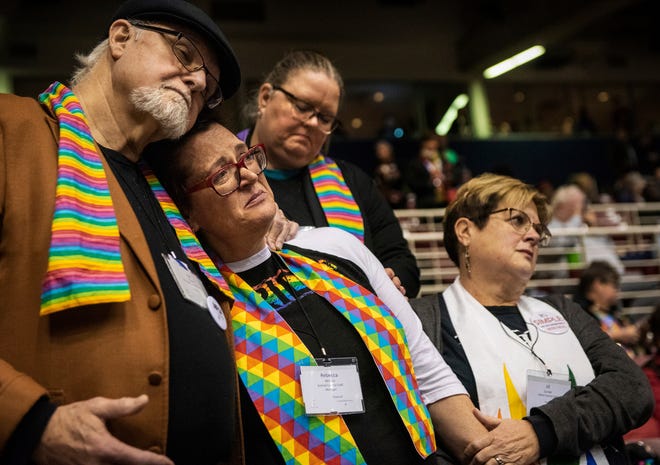The proposed split of the United Methodist Church (UMC) is a cultural marker of the power of deeply held belief to divide religious people. The split is over sex and morality. Specifically, the desire of one group of Methodists to lift the denomination's ban on same-sex marriage and LGBT clergy.
Christians have been divided over moral issues since the time of Jesus. Fortunately, this split does not appear carved in blood as Christian divisions sometimes did centuries ago. Instead, a proposal refers to respecting differences. Here's a quote from USA Today (Jan 3, 2020)
"The undersigned propose restructuring The United Methodist Church by separation as the best means to resolve our differences, allowing each part of the Church to remain true to its theological understanding while recognizing the dignity, equality, integrity, and respect of every person," the proposed agreement states. "The story has been widely circulated; however, the proposed split has not happened yet. In May 2020, the UMC will meet in Indianapolis where any official action would take place. Comments in the story reflect irreconcilable differences (e.g., "polarized sides") and the language of subgroups (e.g., "conservative," "centrist and progressive").
Millions of dollars are at stake thus, the group also addressed ways to deal with the division of money if a new Methodist denomination is created.
The whole presentation in the news media appears to show a friendliness between the groups and a thoroughly modern view of divorce as a good solution. The divorce analogy makes sense, but serves as another reminder that many Western Christians have changed beliefs about acceptable relationships.
Here's a link to a news video on the proposed split from Chicago's WGN
Thoughts on The Deep Divide
In my reading of works by religious scholars, it has been common to see inclusive language suggesting respect of people with diverse opinions about Christian beliefs and practices. Unfortunately, this benign language obscures the deep divisions and palpable differences that barely keep acrimonious remarks unspoken among congregants who ostensibly desire to love their neighbors.
Scholars appear to revel in their embrace of diversity and "different voices." Sometimes the revelry appears superficial as in ensuring discussion groups have people from this or that subgroup of humanity are represented. I say it's superficial because no group can ever represent all the possible subgroups in a large society or organization.
The discussion in the media about the UMC split seems quite benign as I suggested above. Nevertheless, such a divide would not occur unless there is some driving force. Holding beliefs is one thing, acting on them is quite another. In general, human emotions are the driver of behavioral action. It would be hard to imagine one group splitting from another by simply saying something like, "You know what, we can't seem to agree on this issue so why don't you go this way and we'll go that way." I'm not suggesting this did or did not occur. I have no present connections with the UMC.
I am suggesting that all Christians ought to pay attention to the powerful feelings linked to statements about morality and the actions Christians take to persuade others to live according to their moral sentiments, if people want to understand what's happening at a deeper level. I understand that other ideas of depth may be theological, philosophical, sociological, and anthropological, but my focus is on the Psychology of Religion and Spirituality though I consider what scholars write in other disciplines.
From the research on moral foundations theory, matters of same-sex relationships, appear driven by concerns for sanctity and the sacred and fit well with the intratextual fundamentalism theory related to how different Christians read the sacred text, that is, the Bible.
For more on how Christian groups wrestle with the morality of same-sex marriage and relationships, see A House Divided: Sexuality, Morality, and Christian Cultures.
Available on AMAZON and bookstores worldwide.
Connections
Publications (many free downloads)


Comments
Post a Comment